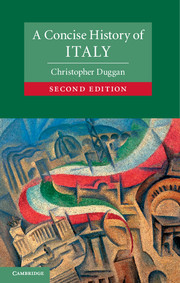Book contents
- Frontmatter
- Contents
- List of Illustrations
- List of Maps
- List of Tables
- Preface
- Chronology
- Introduction
- 1 The geographical determinants of disunity
- 2 Disunity and conflict: from the Romans to the Renaissance, 400–1494
- 3 Stagnation and reform, 1494–1789
- 4 The emergence of the national question, 1789–1849
- 5 Italy united
- 6 The liberal state and the social question, 1870–1900
- 7 Giolitti, the First World War, and the rise of Fascism
- 8 Fascism
- 9 The Republic
- Bibliographical essay
- Index
2 - Disunity and conflict: from the Romans to the Renaissance, 400–1494
Published online by Cambridge University Press: 05 June 2014
- Frontmatter
- Contents
- List of Illustrations
- List of Maps
- List of Tables
- Preface
- Chronology
- Introduction
- 1 The geographical determinants of disunity
- 2 Disunity and conflict: from the Romans to the Renaissance, 400–1494
- 3 Stagnation and reform, 1494–1789
- 4 The emergence of the national question, 1789–1849
- 5 Italy united
- 6 The liberal state and the social question, 1870–1900
- 7 Giolitti, the First World War, and the rise of Fascism
- 8 Fascism
- 9 The Republic
- Bibliographical essay
- Index
Summary
The Dark Ages, 400–1000
In the realm both of substance and ideals, long centuries of Roman domination bequeathed an enormous legacy to future generations of Italy. Clearance of the ancient forests began in earnest, and the South especially started to assume something of its modern appearance, with huge tracts of deforested rolling uplands covered with wheat-growing estates or latifundia. A network of roads was created, which, with the addition of the Via Francigena between Piacenza and Rome after 800, served as the basis for land communications down to the nineteenth century. Most important of all was the foundation of a string of semi-independent cities stretching across the Po valley, through central Italy, to the South. These municipia were the building blocks of the Roman administrative system, and their autonomy (albeit nominal at times) acted as a beacon that was to help inspire the civic tradition of the Middle Ages.
The achievement of the Romans in bringing first the peninsula and then the whole Mediterranean under their sway exerted a powerful influence on the minds of many of those who followed them. The idea of a strong emperor, who could eradicate warring and factionalism, was the dream of Dante in the early fourteenth century. Machiavelli’s fascination with republican Rome two centuries later caused him to long for a revival of those civic virtues that had once made Italy great. The entire culture of the Renaissance, with its glorification of the classical world, led from the sixteenth century to a growing sense of failure, and a belief that Italians had a duty to make themselves worthy of their heroic past. This belief was to inspire many patriots of the Risorgimento. In a less savoury fashion it also fuelled the rhetoric of fascism, and much of its military aggression, too.
- Type
- Chapter
- Information
- A Concise History of Italy , pp. 31 - 59Publisher: Cambridge University PressPrint publication year: 2013



